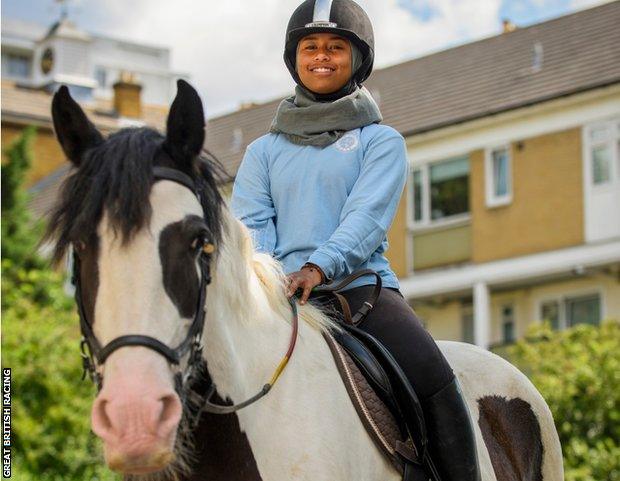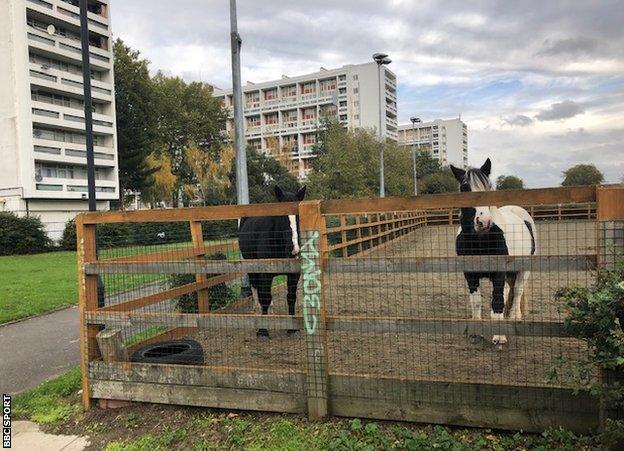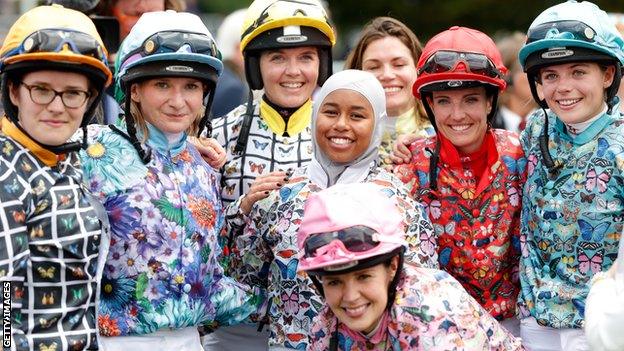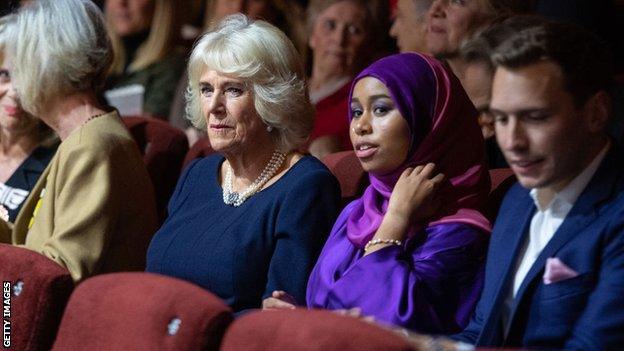Khadijah Mellah: The history-making teen & the Brixton club trying to open up racing
- Published
- comments


Khadijah joined Ebony after her mum came across a leaflet in a local mosque
Tucked away down a side road, between two south London housing estates, is an acre of calm.
Against a backdrop of tower blocks and graffiti, this is where teenager Khadijah Mellah learned to ride horses.
In August, the 18-year-old's smile beamed out from national news bulletins as she became the first British Muslim woman to ride in a horse race, the first jockey to compete wearing a hijab.
Four months earlier, she had not even sat on a racehorse. On Monday, she was the star at her own film premiere.
"There is a stereotype that Muslim women can't go out there and do certain things," she says. "Hopefully this will show my religion in a positive light."
Her remarkable story begins in Millbrook Road, Brixton, at the Ebony Horse Club.

Well versed in preparing bids for funding, Naomi Howgate reels off statistics in her Yorkshire brogue.
She is Ebony's business manager - working to raise money for a charity that aims to help transform lives in one of Britain's most deprived areas. Some 90% of the children who come here are from low-income households (earning £22,000 annually or below); one in three live in poverty.
"Some kids have very complicated lives going on at home or could be going into care," she says. "There are kids who don't get breakfast or tea at home and have something to eat here.
"The kids come for fun but also to look after these real, living breathing animals that need care and respect. And a lot of them don't get that themselves. That creature really depends on them and it builds bonds. Horses are a great leveller. They don't know if you've been bullied because your coat smells.

Ebony Horse Club aims to "raise the aspirations, life skills, education and well being of young people in Brixton"
"A year ago, I thought one of the boys was heading for jail. I saw him teaching other children the other day and it brought tears to my eyes."
Nine horses are stabled underneath railway arches at the club. There's a grazing area and an arena where horses run and jump. When a sofa was fly-tipped nearby, they used it as a makeshift obstacle for the horses. They like to turn a negative into a positive here. "We called it urban showjumping," laughs Howgate.
But there have also been plenty of clear positives to celebrate. Big ones. Perhaps the biggest was Khadijah's golden day at Goodwood.
Hanging on a wall is a paper montage showcasing the media coverage of her ride on 25-1 outsider Haverland in the Magnolia Cup.
Khadijah, from Peckham, joined Ebony after her mum came across a leaflet in a local mosque.
Then she made history.

As the midsummer sun covers the rolling Sussex Downs, you breathe in one of sport's great panoramas against a swirl of panama hats, fascinators and linen suits. This is Glorious Goodwood, a highlight of the racing calendar.
In a corner overlooking the parade ring are a collection of excited youngsters. They stand out. Different dress sense, different vibe. They've travelled only 60 miles but are a world away from the high-rises of the Loughborough and Angell Town estates on the streets of SW9.
They are young Ebony riders, and among them is Khadijah's 16-year-old brother Abdus.
He admires champion jockeys Ryan Moore and Frankie Dettori. He studies their tactics, notes they are careful in using the whip, and one day wants to ride against them.
"For the past two years, I've been training to become an amateur jockey," says Abdus, who has the build, determination and work ethic to make that dream become a reality.
What do his pals make of this ambition?
"In secondary school, there were mixed views but when they hear you do make money from it, they become intrigued."
There are no big financial rewards in the Magnolia Cup, a race for amateur female jockeys over five furlongs and 110 yards (1,110m) which this year raised funds for the Wellbeing of Women healthcare charity.
This is Khadijah's race. She is in the changing room alongside other riders.

Khadijah made sure she did her research on her rival jockeys at Goodwood - and it paid off
Olympic cycling champion-turned jockey Victoria Pendleton is there. There's the model Vogue Williams, professional event rider Sophie van der Merwe and former Apprentice contestant Luisa Zissman.
"Where the boy at?" asks the youngest competitor, inquiring about her mount - trained by Charlie Fellowes - as the butterflies kick in.
Time to race.

"Before the race, I was massively nervous. I was getting ready alongside these amazing women and just fangirling about them," Khadija recalls.
But she made sure she knew about her riding rivals. "I'd done a background sweep on them." She smiles.
Khadijah had been training to be a jockey while fasting for Ramadan and successfully taking A-levels in maths, physics and design technology.
She suffered several falls and failed her first assessment test at the British Racing School in Newmarket, but recovered to line up for the big day.
Headcam footage of the race vividly illustrates the drama on board. The cheers of the 25,000 crowd. And then the unthinkable.
Haverland won. Dreamland.
"When I passed the post I couldn't believe it, and then I saw all my family and friends and started crying. I am quite competitive, so I wanted to win this race, but I never expected to," Khadijah says.
"That was such an unbelievable experience. It is just mind-blowing to think that I was even in the same race as Victoria Pendleton, let alone to beat her and the rest of the women. Even in my wildest dreams I never imagined this could happen.
"My first time on a racehorse was only a couple of months earlier and I had a very rough start. He just took off. It was pretty bad. I'd gone from zero to a hundred quite quickly."

Three months on from that special day, Khadijah is sitting in the grand old Ritzy, a Grade II-listed Brixton cinema which dates back to 1911. They are showing Riding A Dream - a documentary telling her story.
To her right is the Duchess of Cornwall, president of Ebony.
To her left is racing presenter Oli Bell, the nephew of Derby-winning trainer Michael and a patron of the horse club.
Khadijah's parents, originally from Algeria and Kenya, avoid the limelight but take a quiet pride in seeing their daughter's name in lights.
Bell has helped produce the film, which will be broadcast on ITV at 12:15 GMT on Saturday - straight after one of the year's biggest audiences tune in for England's Rugby World Cup final against South Africa.

Khadijah hopes to return to racing and compete against her brother in a charity race in 2021
"Horse racing has got momentum on the back of this story," Bell says.
"It may be considered by some to be an elite white sport but there are yards that are incredible multicultural places.
"Khadijah was willing to break boundaries. Things will only happen if people say yes for change to happen."
The film has been backed by Great British Racing, a promotional arm of the sport that is keen to extend its reach.
According to the Muslim Women's Sport Foundation, the number of female British Muslim jockeys - past and present - is in "single digits".
"When I rode out in Newmarket I tried to spot any other women of colour and there was only one in more than 200 riders," notes Khadijah.
However, jockey Hayley Turner helped mentor her, and Dettori was also on hand to offer advice. The British Horseracing Authority has set up a diversity-in-racing steering group and other inner-city projects have been launched.
At Ebony, the majority of participants are from ethnic minorities.
"You could argue that racing is traditionally a country pursuit, and many of the people involved are white," says the club's engagement manager David Fleming.
"I don't think it's racing's fault, but it needs to be a bit more open and inclusive. It needs to be accessible, and clubs like this require funding."
While Ebony regularly has 150 riders, and welcomes various school projects, it costs £1,000 a day to run.
More than 20 of its youngsters now work in the equine industry. Others are studying for degrees, or have job interviews lined up.
"The young people can see the horses develop, and they are developing as well," says Irishman Fleming, a former employee of racing's powerful Coolmore Stud who foaled the super sire Montjeu.
"We have got children who don't know what a field is. Some of them have never been out of Brixton. But there is so much talent - there are so many Khadijahs out there. Schools are full of them. You just need to get out and say 'come and ride a horse.'"
Khadijah Mellah talks about becoming the first jockey to race in Britain wearing a hijab
Khadijah is now studying mechanical engineering at Brighton University. She hopes to return to racing and compete against her brother in a charity race, maybe in 2021.
She is playing polo for the university team, and wants to make her mark away from the racetrack one day.
"I love physics and want to invent and create things that will make a difference," she says. "I think about working on projects for sustainable energy or bionics and making an impact through engineering. I never thought I'd make an impact through riding.
"I initially didn't really get why people saw what I did as such an achievement. But then if I was looking at it from the outside, I would have been following this story 100%.
"A Muslim kid in a race - I'd be like: 'Keep going girl!'"